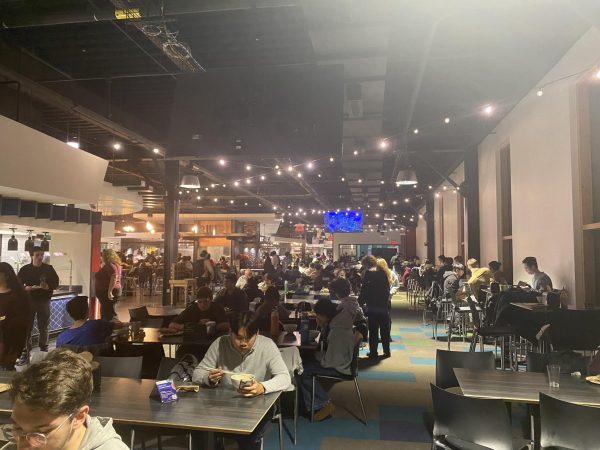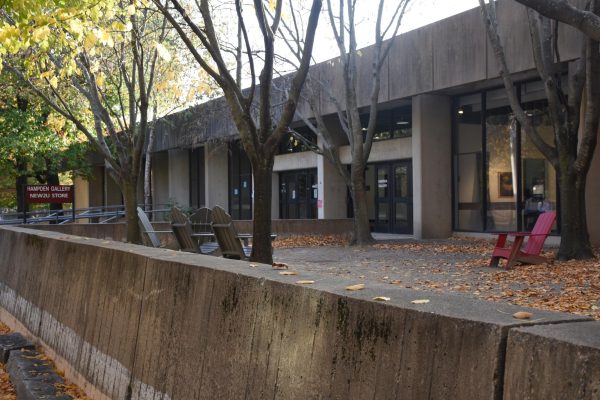Reforming an incarcerated America
How do we reform the justice system in a country that has unparalleled rates of incarceration and of those returning to prison?
This common question is growing in the conversations between members of the American public, millions of which are intertwined in the criminal justice system at various levels.
Many politicians, academic leaders, and reformists offer a solution to the growing problem: education. With the growth of postsecondary education classes being offered to people who are incarcerated around the country and in our local community, there is clear evidence indicating education’s rehabilitating abilities.
On the national level, education programs within prisons are increasing as correctional facilities, academic institutions, national organizations, and businesses are seeing the quantitative data that proves that these programs reduce recidivism — the tendency of a criminal to re-offend after leaving prison — and, consequently, reduce the costs with which incarceration burdens taxpayers.
These programs have an overwhelmingly positive socioeconomic impact on the community in which they are offered. “Prison is an incredibly expensive resource,” says Ruth Delaney, a program manager at the VERA Institute for Justice who provides assistance to corrections agencies and colleges looking to expand postsecondary education in prisons. Any program that lowers recidivism lowers the cost of prison, and a summary of the research done for the last 35 years “has shown us that [for] people who participate in college programs in prison, the likelihood of them going back to prison is 48 percent less.” Not only does this give people who were formerly incarcerated the opportunity to redeem themselves, and make the communities in which they are released safer, but funding for programs like this will also deliver direct economic turnout — “for every $1 invested, [it] has been shown to produce four or five dollars in return” to be exact, indicated by Delaney.
Education programs also produce highly qualified employees upon release, which business owners are usually satisfied with. Ben Pierce is the Hiring Manager of the Massachusetts based company Holt & Bugbee, which employs formerly incarcerated individuals. He notes, “A growing economy needs people who are willing to work . . . This includes hundreds of thousands of people who are entangled in various levels of the criminal justice system.”
Employment Coordinator at the Hampshire County Jail, Rafael Santos, says that “we try discerning whos appropriate to go out [for work release] based on their institutional adjustment; their involvement in education and treatment.” He notes that even in classes that may not have a direct association with the jobs that they are seeking boosts their appeal in the workforce because “it shows that they’re doing something while in custody, being proactive.” Consequently, many different aspects of a society observe a cascade of benefits of prison education.
UMass Amherst is actually involved in this national movement, collaborating with the Hampshire County Jail to provide people who are incarcerated with an opportunity for education and expression.
Professor Annie Raymond in the Math Department began a lecture series at the jail in the fall of 2018. She had previously been involved with larger-scale prison education programs in Seattle and Berkley and wanted to bring that opportunity to the UMass community. Here in Hampshire County, professors from different departments commute to the Hampshire County Jail to give lectures on a wide variety of topics, ranging from how the brain works to computer coding. The relationship between UMass and Hampshire County Jail is still in its infancy, but Professor Raymond hopes to cultivate it into a more well-established program that forms a direct “pipeline” between release from jail to enrollment at UMass — or even a class that regular UMass students take alongside students who are incarcerated. Professor Raymond values how much the students at the jail truly appreciate the opportunity they have been given and emphasizes that it will go a long way towards improving society in the long run.
Another faculty member involved, Professor Paul Collins from the Legal Studies department, lectures on myths of the Supreme Court. He echoes the sentiment of his colleagues, saying the students who are incarcerated are “one of the most engaged audiences I’ve ever had giving a lecture . . . [they] seemed genuinely excited to be talking to somebody about an issue that they care about.” Along with an interest in the subject came an interest in this University. “I did get [the] impression that some of these inmates were thinking about enrolling in college classes,” Professor Collins states, “and one of them specifically mentioned UMass.” If the program gains more support and more funding from UMass, this could certainly be possible. It would give UMass students the opportunity to encounter extremely different experiences, says Professor Raymond, which creates a rich and diverse campus, along with providing a stable future for those incarcerated.
The Social Justice Journalism class here at UMass Amherst, the first class that extends the opportunity for UMass students to get involved with the program and allows incarcerated people to earn college credit, was created by Professor Razvan Sibii and formerly co-taught by Shaheen Pasha. The course allows journalism students to teach the practice of journalism to people who are incarcerated and discuss issues of mass incarceration with them, creating a mutual learning process. An alumnus of UMass and former student of the class, Olivia Jones, notes the transformative experience the class had on her. She confessed that, as a prosecutor, “I spent a lot of time thinking about the inmates as cases” but the class reformed her to see those who are incarcerated on a holistic level — as complex people that have a past and a future. Education, specifically in areas such as journalism, amplifies the voices of the people who are incarcerated; a voice that is arguably the most important one to hear in the issue of mass incarceration. “It’s reminding them that they have a voice . . . no matter if they are being called a number or an inmate . . . that they’re people that can tell stories,” Jones says.
Not only is there quantitative data demonstrating the social and economic benefits of such programs, but there is also another facet to the issue that can not simply be explained by numbers. Education allows incarcerated students to regain a sense of dignity and humanity that the prison experience often strips from them and allows them to have something to look forward to in the midst of their repetitive and mundane lives behind bars. “People had told us that this was the first time in a long time that they felt valued . . . that someone appreciates their brain,” says Professor Sibii.
Olivia Jones remembers that one of the incarcerated individuals she worked within the classroom had told her that “he had something to live for” and she had seen the effects of the classes in “instilling determination and perseverance” in the other incarcerated people.
Every national movement begins at a local level.
From programs like those offered by Boston University, and organizations like Petey Green that further supplement prisoner’s education with volunteer tutors, participation in such educational programs in Massachusetts is extensive.
Here at Hampshire County, The spirit of education and its reverberating effects can be felt in the classrooms of the County Jail, and the room in which many prisoner’s graduate for the first time in their lives. UMass Amherst has many plans in expanding the classes they offer at the jail, and by utilizing the enthusiasm of students and the expertise of the professors, along with the potential and willingness to learn of the inmates at the Hampshire County Jail, the local community at Amherst and Hampshire County could be a leader in incorporating education in prison. Massachusetts is a leading example for higher education in America, “and I’d love for them [Massachusetts] to be an example on education in prison as well,” Delaney states.
Email Saliha at sbayrak@umass.edu or follow her on Twitter @Saliha_B114
Email Karen at kkimble@umass.edu











